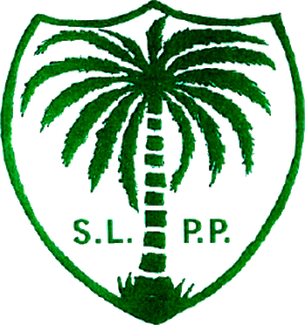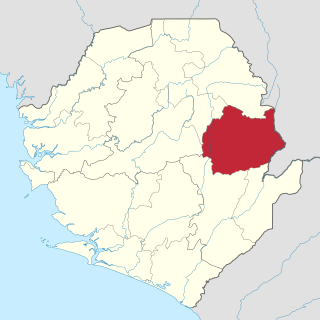Related Research Articles
Sierra Leone first became inhabited by indigenous African peoples at least 2,500 years ago. The Limba were the first tribe known to inhabit Sierra Leone. The dense tropical rainforest partially isolated the region from other West African cultures, and it became a refuge for peoples escaping violence and jihads. Sierra Leone was named by Portuguese explorer Pedro de Sintra, who mapped the region in 1462. The Freetown estuary provided a good natural harbour for ships to shelter and replenish drinking water, and gained more international attention as coastal and trans-Atlantic trade supplanted trans-Saharan trade.

Alhaji Ahmad Tejan Kabbah was a Sierra Leonean politician who served twice as the 3rd President of Sierra Leone, from 1996 to 1997 and again from 1998 to 2007. An economist and attorney by profession, Kabbah spent many years working for the United Nations Development Programme. He retired from the United Nations and returned to Sierra Leone in 1992.

The Sierra Leone People's Party (SLPP) is one of the two major political parties in Sierra Leone, along with its main political rival the All People's Congress (APC). It has been the ruling party in Sierra Leone since April 4, 2018. The SLPP dominated Sierra Leone's politics from its foundation in 1951 to 1967, when it lost the 1967 parliamentary election to the APC, led by Siaka Stevens. Originally a centre-right conservative party, since 2012 it identifies as a social democratic party, with a centrist tendency.

Siaka Probyn Stevens was the leader of Sierra Leone from 1967 to 1985, serving as Prime Minister from 1967 to 1971 and as President from 1971 to 1985. Stevens' leadership was often characterized by patrimonial rule and self-indulgence, consolidating power by means of corruption and exploitation.

Julius Maada Wonie Bio is a Sierra Leonean politician, and the current president of Sierra Leone since 4 April 2018. He is a retired brigadier in the Sierra Leone Army and was the military head of state of Sierra Leone from 16 January 1996 to 29 March 1996, in a military junta government known as the National Provisional Ruling Council (NPRC). As the candidate of the main opposition Sierra Leone People's Party (SLPP), Bio defeated Samura Kamara of the ruling All People's Congress (APC) in the runoff vote of the 2018 Sierra Leonean presidential election with 51.8% of the votes to Kamara's 48.2%. International and local observers declared the election free and fair. He succeeded Ernest Bai Koroma as president.

Pujehun District is a district in the Southern Province of Sierra Leone. Pujehun District is one of the sixteen Districts of Sierra Leone. Its capital and largest city is the town of Pujehun. The other major towns in the district include Gandorhun, Zimmi, Gendema, Masam, Bomi and Potoru. As of 2015, the district has a population of 345,577.
The Sierra Leone Civil War (1991–2002), or the Sierra Leonean Civil War, was a civil war in Sierra Leone that began on 23 March 1991 when the Revolutionary United Front (RUF), with support from the special forces of Liberian dictator Charles Taylor's National Patriotic Front of Liberia (NPFL), intervened in Sierra Leone in an attempt to overthrow the Joseph Momoh government. The resulting civil war lasted 11 years, enveloping the country. It left over 50,000 dead.
The People's Movement for Democratic Change (PMDC) is a liberal party in Sierra Leone. It is a breakaway faction of the Sierra Leone People's Party (SLPP). It was officially registered on 19 January 2006. The party is led by Charles Margai, the son of Sierra Leone's second prime minister Sir Albert Margai and the nephew of Sir Milton Margai. The PMDC is based in the country's second largest city of Bo.
Charles Francis Kondo Margai is a Sierra Leonean politician and constitutional lawyer who served as Attorney General and Minister of Justice of Sierra Leone in 2018.

Ernest Bai Koroma is a Sierra Leonean politician who served as the fourth President of Sierra Leone from 17 September 2007 to 4 April 2018.
Mohamed Yahya Sillah is a Sierra Leonean politician, journalist and human rights activist. He was active in the transition efforts from military to civilian rule in Sierra Leone. As the National Chairman of the National Alliance Democratic Party (NADP), he was an unsuccessful candidate in the 1996 Presidential elections.

Kono District is a district in the Eastern Province of Sierra Leone. Its capital and largest city is Koidu Town. Motema is the second most populous city in the district. The other major towns in the district include Yengema, Tombodu, Jaiama Nimikor and Sewafe. The district is the largest diamond producer in Sierra Leone. The population of Kono District is 505,767. Kono District borders Kenema District to the southwest, The Republic of Guinea to the east, Koinadugu District to the northeast and Kailahun District to the southeast. Kono District is divided into fourteen chiefdoms.

General elections were held in Sierra Leone on 11 August 2007. Seven candidates competed in the first round of the presidential election; no candidate received the necessary 55% of the vote to win in the first round, and a second round was held between the top two candidates, Ernest Bai Koroma of the All People's Congress (APC) and Solomon Berewa of the Sierra Leone People's Party (SLPP), on 8 September. According to official results, Koroma won the election with 54.6% of the vote.

Parliamentary elections were held in Sierra Leone on 1 May 1982. They were the first elections since the country had become a one-party state under the 1978 constitution, with the All People's Congress being the sole legal party.
Mattru Jong commonly known as Mattru is the capital of Bonthe District in the Southern Province of Sierra Leone. Mattru Jung is located on the mainland of Bonthe District, along the Jong River, 52 miles southwest of Bo. The town is the seat of Mongerewa Jong Chiefdom, and is the home of Mongerewa Jong Paramount Chief Alie Badara Sheriff III. The town's current estimated population is about 20,000 people. In 2010 it was 8,199, and in the 2004 census the town had a population of 7,647.

General elections were held in Sierra Leone on 17 November 2012. The result was a sweeping victory for the ruling All People's Congress. Its leader, incumbent president Ernest Bai Koroma, won 58.7% of the vote, enough to win a second term without the need for a runoff. The APC also won 67 of the 112 elected seats in Parliament. To date, it is the APC's best showing at an election since the restoration of multiparty politics in 1991.

Dr Samura Mathew Wilson Kamara is a Sierra Leonean politician and economist. He was the All Peoples Congress (APC) Party's candidate for President of Sierra Leone in the 2018 election. He was the Minister of Foreign Affairs and International Cooperation of Sierra Leone from 2012 to 2017, Minister of Finance and Economic Development from 2009 to 2013, Governor of the Bank of Sierra Leone from 2007 to 2009, Financial Secretary in the Ministry of Finance during President Ahmad Tejan Kabbah's administration.

In April 1961, Sierra Leone became politically independent of Great Britain. It retained a parliamentary system of government and was a member of the British Commonwealth of Nations. The Sierra Leone People's Party (SLPP), led by Sir Milton Margai were victorious in the first general election under universal adult franchise in May 1962. Upon Sir Milton's death in 1964, his half-brother, Sir Albert Margai, succeeded him as Prime Minister. Sir Albert attempted to establish a one-party state had the ready cooperation of the opposition All People' Congress but met fierce resistance from some cadre within his party Sierra Leone People's Party (SLPP) and ultimately abandoned the idea.
Alhaji Moijueh Emmanuel Kaikai is a Sierra Leonean politician and the Sierra Leone Minister of Social Welfare, Gender and Children's Affairs since 2013. He had previously served as the resident Minister of the Southern Province, and Deputy Minister of Labour.
References
- 1 2 Gberie, Lansana (2005). A Dirty War in West Africa: The RUF and the Destruction of Sierra Leone.
- ↑ "Sierra Leone TRC - Volume Three A, Chapter Three". Archived from the original on March 27, 2014.